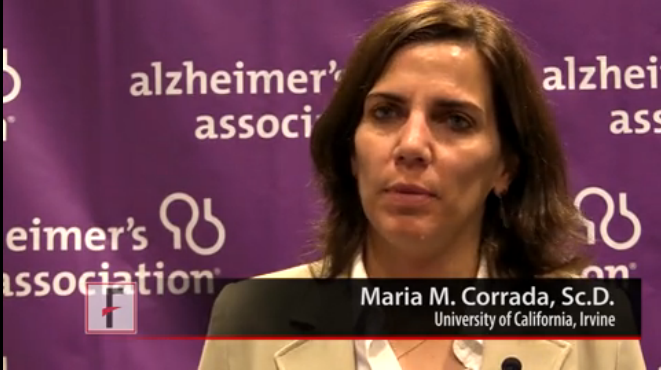User login
COPENHAGEN – When it comes to treatment of hypertension, perhaps not all age groups should be treated equally, according to findings from a study of very elderly patients.
The 90+ Study, which analyzed data from 625 dementia-free participants, showed that developing high blood pressure in the 80s and 90s was associated with a reduced risk of developing dementia, researchers reported at the Alzheimer’s Association’s International Conference.
They also found that as the participants’ blood pressure level increased, their risk of dementia decreased. Results remained the same after researchers adjusted for hypertension medication and history of stroke or heart disease.
The findings are important because people who are in their 80s and 90s are among the fastest growing segments of the U.S. population, said Maria M. Corrada, Sc.D., an epidemiologist at the University of California, Irvine.
In a video interview, Dr. Corrada explains the research findings and the implications for clinical practice.
The video associated with this article is no longer available on this site. Please view all of our videos on the MDedge YouTube channel
On Twitter @naseemmiller
COPENHAGEN – When it comes to treatment of hypertension, perhaps not all age groups should be treated equally, according to findings from a study of very elderly patients.
The 90+ Study, which analyzed data from 625 dementia-free participants, showed that developing high blood pressure in the 80s and 90s was associated with a reduced risk of developing dementia, researchers reported at the Alzheimer’s Association’s International Conference.
They also found that as the participants’ blood pressure level increased, their risk of dementia decreased. Results remained the same after researchers adjusted for hypertension medication and history of stroke or heart disease.
The findings are important because people who are in their 80s and 90s are among the fastest growing segments of the U.S. population, said Maria M. Corrada, Sc.D., an epidemiologist at the University of California, Irvine.
In a video interview, Dr. Corrada explains the research findings and the implications for clinical practice.
The video associated with this article is no longer available on this site. Please view all of our videos on the MDedge YouTube channel
On Twitter @naseemmiller
COPENHAGEN – When it comes to treatment of hypertension, perhaps not all age groups should be treated equally, according to findings from a study of very elderly patients.
The 90+ Study, which analyzed data from 625 dementia-free participants, showed that developing high blood pressure in the 80s and 90s was associated with a reduced risk of developing dementia, researchers reported at the Alzheimer’s Association’s International Conference.
They also found that as the participants’ blood pressure level increased, their risk of dementia decreased. Results remained the same after researchers adjusted for hypertension medication and history of stroke or heart disease.
The findings are important because people who are in their 80s and 90s are among the fastest growing segments of the U.S. population, said Maria M. Corrada, Sc.D., an epidemiologist at the University of California, Irvine.
In a video interview, Dr. Corrada explains the research findings and the implications for clinical practice.
The video associated with this article is no longer available on this site. Please view all of our videos on the MDedge YouTube channel
On Twitter @naseemmiller
AT AAIC 2014
